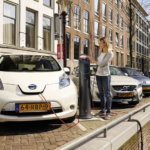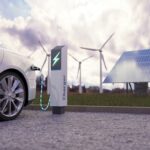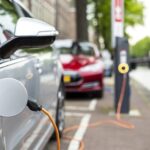Al eerder heeft Hugo Matthijssen aandacht geschonken aan elektrische auto’s. Uit zijn analyse bleek dat het nog niet erg wil vlotten met de invoering daarvan als gevolg van de hoge prijs, de beperkte actieradius en het gebrek aan laadpunten en lange oplaadtijden voor de betrokken auto ‘s.
Ook in Duitsland dat de ambitie koesterde om Weltmeister te worden op het betrokken gebied, begint men zich nu achter de oren te krabben of dit wel zo’n verstandig idee was. In onderstaande video van de ARD verklaren deskundigen dat de oorspronkelijke doelstellingen bij lange na niet zullen worden gehaald.
Onder de titel, ‘German auto industry risks skidding out of control’, rapporteerde Pierre Gosselin op NoTricksZone:
The news on the electric car situation in Germany does not look good. As it turns out that the government and industry are not really that serious about it, despite all the lofty green rhetoric.
In fact the ARD reports that Daimler has even stopped production of electric cars so that the production line could instead be used to produce regular internal combustion engine cars (ICEs) for deliveries to China and USA. So much for Daimler CEO’s pledge to “become a leader in electric cars.” In fact all German automotive CEOs posture as leaders in electric cars, but the reality is different.
ARD wonders why so few electric cars are sold in Germany, despite test drivers finding them quite pleasant to drive – to a certain point. In fact ARD calls Germany e-car sales figures a “a catastrophe”, as only 32,000 electric cars have been registered so far. The target is 1 million by 2020, something that analysts now call “a fairy tale”. The German auto industry puts the blame squarely on the government.
But whose fault is it really for the terrible electric car sales in Germany? ARD decided to look into the topic more deeply and uncovered a number of reasons. They discover that the German automakers have in fact very little interest in pursuing electric cars, nor does the German government. …
The truth is that the German automakers are putting the brakes on electric cars. There’s a very good reason for that, the ARD discovered. German automakers are in no rush to shift to electric cars because they fear such a move “would only devalue their ICE technology,” says automotive analyst Prof. Stefan Bratzel. “It is irrational for them to shift far into the electric sector.” …
It’s clear that Germany ditching the ICE spells the end of a bulk of its mighty ICE auto industry, the very backbone of the country’s — economy which employs directly and indirectly 1 of every 6 German worker. What is coming is the titanic clash between climatism and the fundamental economic interests of the German nation. To save itself, Germany will need to show that efficient ICE’s are not bad for the climate, and that the science of climate change was faulty, and that their cars are in fact far superior to electric carts and do not damage the climate as claimed.
Zie verder hier.
Het valt op dat de wens tot vermindering van de uitstoot van CO2 een centrale rol speelt in de voorstellen om tot elektromobiliteit te komen. Trouwe lezers weten inmiddels dat CO2 hoogstens een onbeduidende rol speelt in de geringe opwarming van de aarde (die zo’n 19 jaar geleden is gestopt) en dat deze per saldo meer voor- dan nadelen met zich brengt voor mens en natuur. Dus waarom dan die focus op CO2? En waarom dan zo’n heisa over de wijze waarop de autoindustrie de uitstoot berekent? Toegegeven, daar wordt mee gesjoemeld. Maar is het niet een storm in een glas (spuit) water?
Hoe het ook zij, alweer een sprookje minder.
Voor mijn eerdere bijdragen over klimaat en aanverwante zaken zie hier, hier, hier, hier en hier.






De afgelopen weken is het (vooral in het zuiden van ) Duitsland regelmatig tussen min 15 en min 20 geweest. Iemand een idee wat dat met de prestaties en actieradius van zo’n electrisch speeltje doet?
Ronel
De auto rijdend met een verbrandingsmotor gebruikt de restwarmte van de motor voor verwarming van het interieur.
Elektrische auto’s rijden voor 81% op fossiele brandstof. Daarbij wordt de restwarmte van de centrale in de lucht of de rivier gepompt.
In de winter moet vervolgens het interieur en de ruiten verwarmd worden met elektrische systemen die veel energie gebruiken.
Alleen daardoor en een minder efficiënt werkende akku is de actieradius in de winter zo’n 40% minder dan in de zomer.
Hier een praktijkonderzoek waar duidelijk wordt wat de verschillen zijn.
http://www.groningerkrant.nl/2014/04/longread-de-elektrische-auto-wel-zon-goed-idee-een-praktijkbenadering/
Met een beetje geluk weten de Duitse E-auto bezitters dit inmiddels ook. Zouden die op verjaardagen nu nog steeds op lopen scheppen over hun karretje ;) ?
In Keulen een proef met 8 electro bussen, geen succes vanwege kou: minder accucapaciteit en bij lage temperaturen moet ook de verwarming onafgebroken aan:
https://www.eike-klima-energie.eu/2017/01/20/batterien-verlieren-im-frost-strom-koelner-e-busse-haben-probleme-mit-kaelte/
Volgens reactie van ene U.Langer in de link ging het ook mis met een proef in Berlijn.
In Nederland is er het “groene” streven (= linksdraaiend fata morgana) voor 8 miljoen vol-elektrische auto’s in 2030! Zonder 4 stuks nieuwe type veilige CO2-loze (Thorium-MSR) kerncentrales in Nederland zal het nooit GROEN worden, die elektrische auto’s. Op basis van de huidige kernenergie ban in NL gaan we dan in plaats van kernenergie zo’n 150.000 stuks windmolens bij plaatsen om die benodigde stroom in 2030 te kunnen leveren. Dit dan nog los van de extra elektriciteit capaciteit behoefte vanwege het recente afschaffingbeleid van aardgas voor de huishoudens in NL. En we weten inmiddels ook, dat windmolens géén CO2-besparing opleveren, dus niet duurzaam zijn, en nooit meer dan 20% windcapaciteit kan worden ingevoegd in de basislast stroomcapaciteit, omdat dan de balancering van het nationale elektranet te risicovol wordt voor totale black-outs. De elektrische auto is er, en blijft, maar is vooral nog oningepast wensdenken en exotisch zeer geschikt voor de groene “duurzaam” politiek gemotiveerde. Dat het niet opschiet met de vol-elektrische auto is ook logisch.
Als de wet van vraag en aanbod voor electrische auto’s had gegolden, waren ze er NOOIT gekomen. Alleen dankzij subsidies, die de burger mag ophoesten, rijden er toch een paar. Pure concurrentievervalsing en pure verspilling. Maar ja het is groen. Toch? En dan mag het plotseling weer wel.
Het zijn er nu net 10.000
Een essentieel stukje tekst voeg ik hier toe: “The German automotive industry faces yet another problem: their car fleets will have to meet strict EU CO2 emissions standards by 2020. By then the average car will be allowed to emit only 95 g of CO2 per km. ”
Dat lukt natuurlijk nooit met Audi’s, BMW’s en Mercedessen.
De opties zijn frauderen of de klimaatdoelstellingen aanvallen.
Evenals bij windmolenparken en zonnepanelen dringt zich bij de elektrische auto de term “kippendrift” op. Waarom die haast? Batterijen bieden niet veel verbetering meer vwb energie/kg. Waterstof is vervelend spul. Waarom geen andere brandstoffen gemaakt zoals diethyl-ether wat een goede diesel vervanger schijnt te zijn. Maak die dan met de power van windmolens (op zee) dat spaart miljarden op aanpassing aan het net. Zo gebruikten onze voorouders hun molens ook: om voorraden (meel,olie. balken…) aan te leggen. Nog beter: wacht op de nieuwe generatie nucleaire reactoren. Er is nog zat tijd voor de energietransitie. Bovendien wordt nu veel geld verspild dat niet naar research gaat.
EROI van windenergie is al laag, gemeten aan de fossiele back-up capaciteit nodig, en bij effectief 70% geen windenergie op jaarbasis. Met diethyl-ether ( zeer vluchtige en ontvlambare vloeistof die bij 34,6°C kookt) is het zelfde als met waterstof vanuit windenergie. De kosten van productie, compressie, opslag transport en veiligheid verlagen slechts het gehele rendement (EROI) van de initiële energiebron (windenergie). Met CO2-loze kernenergie zou het te overwegen zijn, echter beide vluchtige BRANDstoffen blijven een gevaarlijke ontplofbare brandstof, waar je geen ferries of tunnels mee in mag. Geen “duurzaam” en onpraktisch idee dus, David.
Het zou mij niets verbazend als de duitse regering, teneinde hun autoindustrie te redden, uiteindelijke zal gaan draaien in hun standpunt tav. de ‘catastrofale’ gevolgen van de CO2-‘vervuiling’ en zal gaan proberen om via EU-wegen de scherpe uitstootnormen terug te draaien.
In het laatste alinea van het aangehaalde citaat van Pierre Gosselin wordt ook al naar iets dergelijks verwezen:
“To save itself, Germany will need to show that efficient ICE’s are not bad for the climate, and that the science of climate change was faulty, and that their cars are in fact far superior to electric carts and do not damage the climate as claimed.”
Wat ik zo vreemd wind is dat de waterstof auto volledig van het toneel verdwenen is (er is zelfs weinig online nog over terug te vinden) en dat terwijl er meer dan 5 versies van de NECAR (en later de F-Cell (2010)) ontwikkeld zijn welke vele betere opties waren dan dit gedoe met rijden op accu’s.
Hier een overzichtje tot de NECAR 5 (uit 2000).
http://www.diebrennstoffzelle.de/h2projekte/mobil/necar.shtml
Kun je hier iets mee?
http://www.fueleconomy.gov/feg/fuelcell.shtml
http://www.nrel.gov/hydrogen/proj_fc_analysis.html (kijk ook onder ‘Publications’ bovenaan lijst)
Of deze:
https://www.energyagency.at/fileadmin/dam_en/pdf/fuelcells02/Status_of_fuel_cell_technology_Grontmij_AB.pdf
Fuel-cell-eCar is rijdende bom! Lekker “veilig” en “duurzaam” ook die waterstof of diethyl-ether productie!?
eNdEmiOn
Waterstof komt niet vrij in de natuur voor.
Het is altijd gebonden zoals in koolwaterstoffen en bijvoorbeeld in water.
Waterstof kun je alleen produceren uit water middels elektrolyse en dat vereist erg veel energie.
Je gebruikt stroom om waterstof te produceren en vervolgens maak je in je brandstofcel weer van waterstof stroom. Dat schiet lekker op. dubbele verliezen.
Daarnaast moet je waterstof ook nog eens opslaan in tanks. Dan moet je de watersof comprimeren en ook dat kost nog eens erg veel energie die als warmte wordt afgevoerd.
Waterstof als brandstof van de toekomst is wensdenken maar in de praktijk niet wenselijk.
Europese Unie (EU) eist maatregelen tegen nepnieuws bij sociale media. http://www.elsevier.nl/buitenland/achtergrond/2016/12/juncker-wil-geen-nepnieuws-meer-zien-424233/ .Maar wat is nepnieuws en wat is vrijheid van meningsuiting, en waar ligt de grens? Thans is de balans dat vooral de linksdraaiende pers en EU zich “grote” zorgen maakt over nepnieuws terwijl de linkdraaiende pers zelf fanatieke verspreiders van “nepnieuws” zijn. (in NL bijvoorbeeld valsnieuws verspreider joop.nl over geenstijl.nl, Telegraaf, Elsevier, DDS etc ). Opvallend voorbeeld is van de Trump-tegenstander de Washington Post: http://xandernieuws.punt.nl/content/2016/12/Washington-Post-erkent-dat-Russische-nepnieuws-propaganda-lijst-nepnieuws-is
Dus… als alle voertuigen elektrisch moeten worden, waarom dan niet te beginnen met tanks en leger voertuigen?
Dat zijn per slot van rekening DE benzine/dieselslurpers/vervuilers.
Niet 1 op 20, nee 20 op 1.
“So… how come… did you lost the war? Wel… uhm… there was no wind and the sun didn’t shine either…it was a very cloudy day you know? ”
Dus overheden.
Geef zelf eerst maar eens het goede voorbeeld!
Haha, moet je eens kijken hoe gauw ze gaan spindocteren dat hun regels voor het volk gelden, maar niet voor hunzelf. Uiteraard in het kader van “landsbelang” etc.
“All animals are equal but some anima….!” – afijn u kent hem wel.
Maar ook: vanaf nu: alle politici , groene NGO’s, warmista’s et all: allemaal verplicht elektrisch rijden! Of op waterstof: wat ze maar propageren.
Trouwens nog een onderbelicht dingetje: als een elektrische auto crasht, in brand vliegt IS er een kans dat de auto onder stroom komt te staan en de brandweer niet kan blussen omdat ze anders onder stroom komen te staan.
Dit deed zich enkele maanden geleden voor. Weet niet meer waar.
En ja, een benzine/brandstoftank kan ontploffen ja. Ook niet zonder gevaar.
Maar elke oplossing heeft zo zijn eigen problemen en die worden in de waan van de dag wel eens over het hoofd gezien.
Maar nogmaals warmista`s en hemelbestormers : Verbeter de wereld , maar begin bovenal bij u zelf!
Praten we dan weer verder, oke?
De grootste vervuilers in NL: de 2-takt bromachtigen.
Die pakt schijtgroen niet aan om de “draagkracht” onder jongeren niet te verliezen.
Wat een onsamenhangende bullshit, Wiersma! Ga ergens elders squatten.